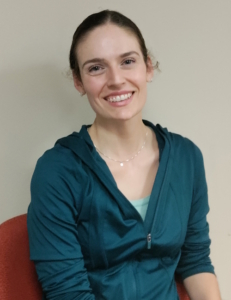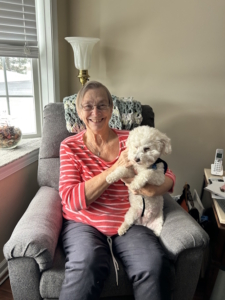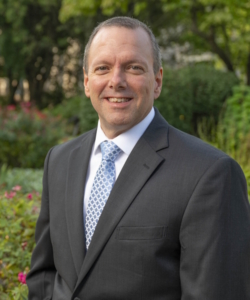Homeland Nurse Batya Kassner: Helping Families Experience ‘Love in Action’
 As a nurse case manager for Homeland Hospice, Batya Kassner finds the collaborative spirit and teamwork “amazing.”
As a nurse case manager for Homeland Hospice, Batya Kassner finds the collaborative spirit and teamwork “amazing.”
“Everyone respects everyone else’s role that they play, and everyone is more than willing to jump in and help with whatever is needed,” Kassner said. “The communication is awesome. No team works together without good communication.”
Kassner has been a Homeland Hospice nurse since the fall of 2023. In a career devoted to nursing, this is her first time working in a hospice setting.
She knew she was in the right place when she experienced a particular moment with a Homeland Center resident and patient. As he took his last breath, he was surrounded by his best friend, Homeland Center staff, and the Homeland Hospice social worker.
“I feel like everything clicked, and I thought that this is how it should be,” she said. “It must have been so good for him to know he was surrounded by all these people who loved him, cared about him, were looking out for him, and covered all the bases of his and his loved ones’ needs. It felt like such a complete moment.”
Kassner is a native of the Harrisburg area who enjoyed volunteering at nursing homes while she attended Trinity High School. She tested her interest in long-term health care by becoming a certified nurse assistant in a small assisted-living facility in Baltimore. Her supervisor, a nurse who co-owned the facility, encouraged Kassner to pursue her nursing degree, which she completed at the University of Illinois Chicago.
While still in nursing school, Kassner was fascinated by an internship in a behavioral health facility. When she returned to the Harrisburg area, a Homeland Hospice team member she knew from her synagogue suggested that she shadow a Homeland Hospice nurse. She loved the experience.
She realizes now that hospice combines her love of getting to know long-term care patients with the emotional intricacies she experienced while shadowing in the behavioral health facility.
“You’re dealing with pain,” she said. “You’re dealing with grief. You’re dealing with loss. You’re helping people through a really difficult time in their life and through a transition.”
The nurses at Homeland Hospice, a service of Homeland at Home, fulfill a wide range of duties. While monitoring patients and managing symptoms, they also ensure that families have all the necessary equipment and supplies. They are liaisons to the range of complementary services available for patients, including podiatry, massage, music therapy, and in-home support for family caregivers.
Listening is the key to success, Kassner said.
“Sometimes, people just have to vent,” she said. “They’ve had a rough year or multiple years going through chronic disease. A lot of it is being able to sit, listen, and understand and not try to fix everything immediately. You can’t assess needs until you really sit and listen to someone.”
Her patients might be in their homes, hospitals, or care facilities. She especially appreciates Homeland Center staff for their close relationships with all the residents.
“When I go to Homeland Center, the nurses and staff know who my patients are and immediately tell me what’s been going on with them,” she said. “There’s no having to hunt people down to have to figure out how the patient is doing or how things have changed. They know, and they tell me. It’s really good teamwork.”
Outside of work, Kassner spends time with her five-year-old daughter, who started kindergarten this year and is an avid collector of bugs. Kassner enjoys reading – a recent stretch of “gloomy Russian-prison weather” inspired her to read Dostoevsky – and languages, with Spanish being her best. She is a self-proclaimed “gym rat” and a hiker whose favorite spot is King’s Gap Environmental Education Center, with its breathtaking views and choice of trails.
“It’s beautiful and peaceful,” she said. “I’ve never had a bad hike out there.”
As a Homeland Hospice nurse, Kassner believes she enables families to “live out their love in action” to continue nurturing their time and special relationships with their loved ones.
“To get to be a part of that is a privilege,” she said. “You’ll hear families reminiscing and laughing even after I pronounce that their loved one has passed. The families are gathered in the house, and they’re all remembering the nice times. I love those moments because I know it was peaceful and that the person is still very present in the love they feel around them.”
Homeland Center offers levels of care including personal care, memory care, skilled nursing and rehabilitation. Homeland also provides hospice, home care, home health and palliative care services to serve the diverse and changing needs of families throughout central Pennsylvania. For more information or to arrange a tour, please call 717-221-7900.

 Ginny Jones has been guided by miracles throughout her life. During times of darkness, support has found her and helped her take the next step. For her part, Ginny’s faith in God and humanity ensures her heart is always open to the unexpected grace that blesses us when we need it most. When Ginny’s beloved husband, Art, was in his final days of life, Homeland Hospice was the miracle she needed.
Ginny Jones has been guided by miracles throughout her life. During times of darkness, support has found her and helped her take the next step. For her part, Ginny’s faith in God and humanity ensures her heart is always open to the unexpected grace that blesses us when we need it most. When Ginny’s beloved husband, Art, was in his final days of life, Homeland Hospice was the miracle she needed.  Troy Beaver was weighing three job offers when his dad’s hospice nurse told him what keeps her going every day.
Troy Beaver was weighing three job offers when his dad’s hospice nurse told him what keeps her going every day.
